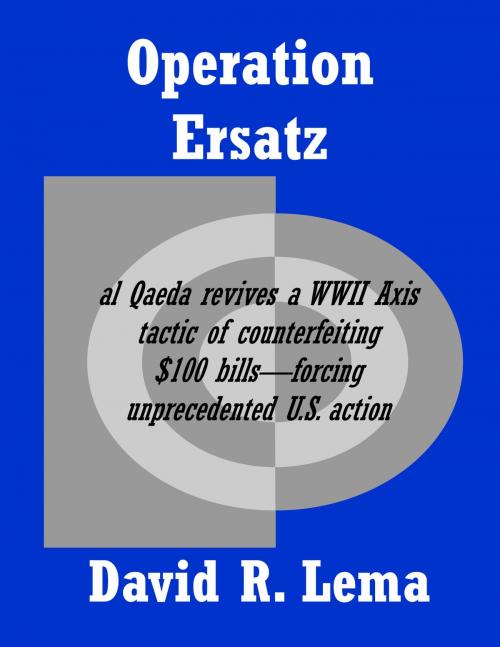| Author: | David Lema | ISBN: | 9780615478111 |
| Publisher: | David Lema | Publication: | April 14, 2011 |
| Imprint: | Smashwords Edition | Language: | English |
| Author: | David Lema |
| ISBN: | 9780615478111 |
| Publisher: | David Lema |
| Publication: | April 14, 2011 |
| Imprint: | Smashwords Edition |
| Language: | English |
Deep in the throes of a project to document the stories of Californians who were World War II veterans of the Pacific Theater, a University professor and her research assistant inadvertently stumble onto an al Qaeda counterfeiting operation hidden in the jungles of the Philippines.
While working to verify reports of a counterfeiting operation run by the Japanese during their occupation of the Philippines in the 1940s, the professor uncovers the phenomenal stories of both the Japanese counterfeiting efforts in the Pacific and those of the Nazis in Europe. She tracks the bogus U.S. $100 bill printing plates used during WWII down two trails from their origins in Nazi Germany and Japanese-occupied China finding that both sets ended up in the hands of the Soviet Union.
Secretly holding both sets of plates for over 40 years, in 1989 the Soviets use the plates as bargaining chips with Iran in one last-ditch effort to save their crumbling Union. Iran promptly uses the plates in a prisoner-swap bargain with their archenemy Iraq who then hatches a sinister partnership with the upstart al Qaeda to establish a counterfeiting operation in the Philippines along with an ancillary operation in North Korea.
About to leave the Philippines, the professor and her assistant are taken captive and held for several months by Abu Sayyaf, one of the most brutal al Qaeda-affiliated groups in the world. During captivity they are tortured and forced to witness some of the most horrendous acts of violence ever carried out against humankind before a last desperate rescue attempt in led by the professor’s long-time boyfriend.
Pieced together with real events, this story reveals a strategic approach of al Qaeda as they resurrect an age-old tactic of counterfeiting as a way to undermine the strength of their enemy. Operation Ersatz also portrays the undaunted heroism and determination of those who find themselves in the position of confronting the vile aspirations of al Qaeda.
Deep in the throes of a project to document the stories of Californians who were World War II veterans of the Pacific Theater, a University professor and her research assistant inadvertently stumble onto an al Qaeda counterfeiting operation hidden in the jungles of the Philippines.
While working to verify reports of a counterfeiting operation run by the Japanese during their occupation of the Philippines in the 1940s, the professor uncovers the phenomenal stories of both the Japanese counterfeiting efforts in the Pacific and those of the Nazis in Europe. She tracks the bogus U.S. $100 bill printing plates used during WWII down two trails from their origins in Nazi Germany and Japanese-occupied China finding that both sets ended up in the hands of the Soviet Union.
Secretly holding both sets of plates for over 40 years, in 1989 the Soviets use the plates as bargaining chips with Iran in one last-ditch effort to save their crumbling Union. Iran promptly uses the plates in a prisoner-swap bargain with their archenemy Iraq who then hatches a sinister partnership with the upstart al Qaeda to establish a counterfeiting operation in the Philippines along with an ancillary operation in North Korea.
About to leave the Philippines, the professor and her assistant are taken captive and held for several months by Abu Sayyaf, one of the most brutal al Qaeda-affiliated groups in the world. During captivity they are tortured and forced to witness some of the most horrendous acts of violence ever carried out against humankind before a last desperate rescue attempt in led by the professor’s long-time boyfriend.
Pieced together with real events, this story reveals a strategic approach of al Qaeda as they resurrect an age-old tactic of counterfeiting as a way to undermine the strength of their enemy. Operation Ersatz also portrays the undaunted heroism and determination of those who find themselves in the position of confronting the vile aspirations of al Qaeda.















